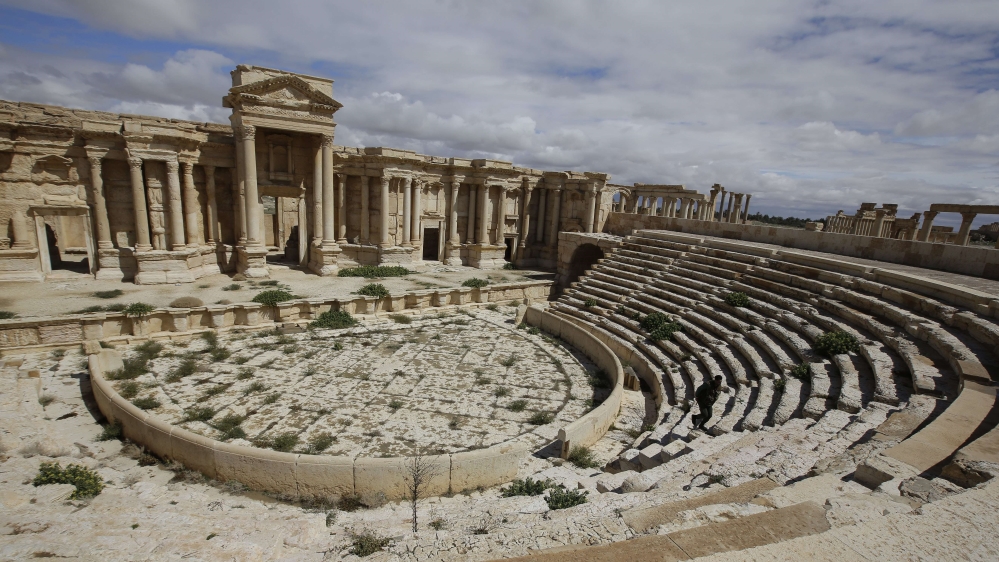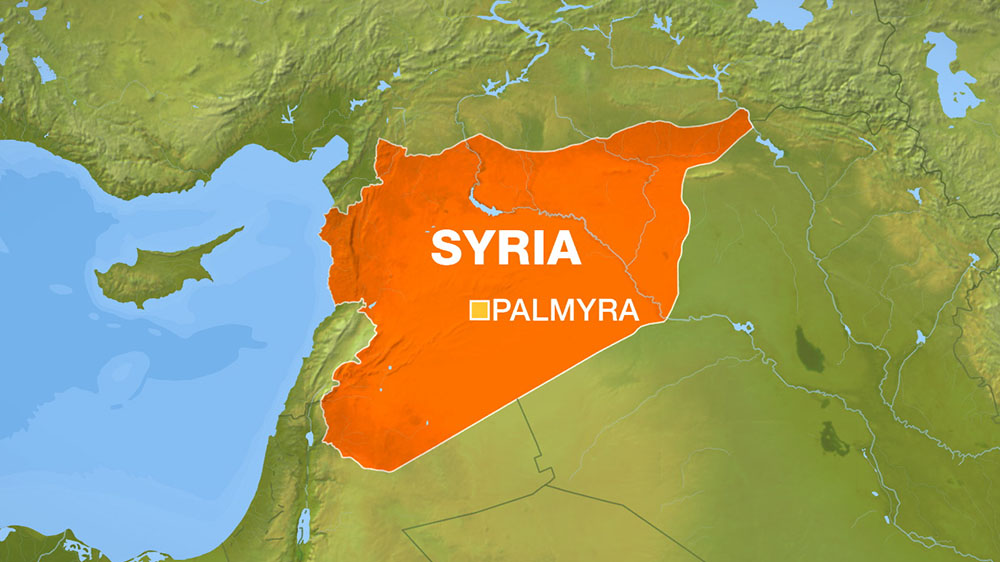You are using an out of date browser. It may not display this or other websites correctly.
You should upgrade or use an alternative browser.
You should upgrade or use an alternative browser.
More options
Who Replied?What a beautiful ancient citySyria's heritage in peril as ISIL captures Palmyra
Syrian army has collapsed after deadly battles to foil group's offensive, according to monitoring group and activists.
Diana Al Rifai | 20 May 2015 21:17 GMT | War & Conflict, Middle East, Syrian crisis, ISIL
ISIL's capture of Palmyra on Wednesday follows a week of deadly battles with Syrian forces [EPA]

Fighters from the Islamic State of Iraq and the Levant (ISIL) have taken full control of Syria's ancient city of Palmyra, according to activists and a monitoring group.
The Syrian army has collapsed and ISIL has taken over the city, the UK-based Syrian Observatory for Human Rights reported.
The monitor reported earlier on Wednesday that ISIL had advanced into Palmyra.
Deadly clashes had raged overnight between the Syrian government and ISIL, with troops firing rockets from outside Palmyra in an attempt to block ISIL's offensive.
ISIL launched an attack on Palmyra last week, causing material damage to residential areas while clashes left many dead and injured.
They managed to capture two gas fields, leaving hundreds dead.
Abo Muaz, an activist in Palmyra, confirmed to Al Jazeera that ISIL had taken the entire city.

The 2,000-year-old city of Palmyra has been listed as a World Heritage site because of its architecture [AFP]
"The Syrian army has retreated, ISIL are infested in almost all of the city. The army began its retreat almost two hours ago," he said.
"We do not hear any clashes taking place, either.
"A large number of families are currently fleeing from several parts of Palmyra. Clashes have been taking place and regime warplanes have not stopped bombing the city."
Palmyra dates back to the 1st and 2nd century.
Located in central Homs province, it lies 210km northeast of Damascus in desert that stretches to the Iraqi frontier to the east.
The city has been listed as a World Heritage site because of its architecture, and is also known as The Pearl of the Desert.
Mamoun Abdulkarim, Syria's antiquities chief, has called on the Syrian army, opposition and the international community to save Palmyra.
Hundreds of statues and ancient artefacts from Palmyra's museum have already been transferred out of the city, according to Abdulkarim.

http://www.aljazeera.com/news/2015/...ol-syria-palmyra-reports-150520184842272.html

88m3
Fast Money & Foreign Objects
What a beautiful ancient city
It's incredible, probably beats anything I saw in Italy.
https://www.google.com/search?q=pal...V5dVaXIM7iLsQT524PYBQ&ved=0CAcQ_AUoAg#imgrc=_
88m3
Fast Money & Foreign Objects
With Syria's Army Losing Ground, A Boost From Hezbollah
MAY 24, 2015 7:27 AM ET

ALICE FORDHAM
Weekend Edition Sunday
3:17

Mourners attend the May 14 funeral of Hezbollah fighter Ahmad al-Amin in Babliyeh, Lebanon. Hezbollah is fighting alongside the Syrian army and Amin was killed while fighting in Syria's Qalamoun mountains against Nusra Front, al-Qaida's branch in Syria. The Syrian army has suffered multiple setbacks recently, but Hezbollah did help dislodge rebel fighters along the Syria-Lebanon border.
Mohammad Zaatari/AP
The dirt roads on the border between Syria and Lebanon wind across a mountain range dotted with little wild flowers.
It's windswept and deserted except for a few hilltop outposts with clumps of gray tents, machine-gun nests and flags that fly the green and gold colors of Lebanon's Hezbollah movement.
These posts are new. In a three-week offensive, Hezbollah has worked with Syrian government forces and other allies to push rebel fighters out of a chunk of territory that the rebels held along this border for two years.
Hezbollah says it's still firing at rebels who are less than a mile away
The group organized a press trip weaving into Syrian territory from Lebanon and made a commanding officer available for interviews in the field – though he was only identified by his nickname, Hajj Nader.
He says is that Hezbollah has faced a tough fight. The rebels were well-armed – their shell casings still litter the ground — and their morale was high.
"They fought like they had nothing to lose," says the stocky man, with dark glasses and a short, dark beard.
Across Syria, rebel fighters have been taking territory recently from President Bashar Assad's forces. Many of these opposition fighters belong to either the self-declared Islamic State or to al-Qaida. In the past week, Syrian regime forces lost the city of Palmyra and a border crossing with Iraq.
Related NPR Stories

PARALLELS
Syria's Minorities: Caught Between Sword Of ISIS And Wrath of Assad
A Crucial Partner For Assad
Hezbollah is considered Assad's most competent ally, and its victory here is the best news for Assad in weeks, which is perhaps why the usually insular group is now inviting groups of journalists to the front line.

PARALLELS
In Syria, Archaeologists Risk Their Lives To Protect Ancient Heritage

THE TWO-WAY
Islamic State Reportedly Seizes Last Syria-Iraq Border Crossing
Hezbollah analyst and author Nick Blanford thinks thinks both Assad and Hezbollah needed to highlight a win. Hezbollah needed to show its grassroots supporters that "this is not our Vietnam, we are winning this war, we are defending the borders of Lebanon," says Blanford. "And more broadly, of course, for the Assad regime it gives the message of a victory that – not all is lost."
But for all the triumphalism, this is just a small part of Syria. Blanford says there are not enough Hezbollah fighters to solve Assad's rebel problem
"Hezbollah are good fighters but it's a question of numbers," he says. The group has strong backing from Iran, as does Assad's army, but Blanford says the group only has about 5,000 active duty Hezbollah fighters and they can't prop up Assad's forces alone.
"If you are looking at the forces loyal to the Assad regime, chiefly the Syrian army,[they're] utterly exhausted after four years of fighting," Blanford says.
Hezbollah's leader Hassan Nasrallah has vowed to protect Assad. That would satisfy the group's obligations to Syria and Iran.
Up in the mountain, the men say their priority is to protect their homeland, as they look down on Lebanese villages. And even here on the border they're spread thin - a formidable force maybe but seemingly not one that can save Assad by itself.
didn't realize things were that bad
MAY 24, 2015 7:27 AM ET

ALICE FORDHAM
Weekend Edition Sunday
3:17

Mourners attend the May 14 funeral of Hezbollah fighter Ahmad al-Amin in Babliyeh, Lebanon. Hezbollah is fighting alongside the Syrian army and Amin was killed while fighting in Syria's Qalamoun mountains against Nusra Front, al-Qaida's branch in Syria. The Syrian army has suffered multiple setbacks recently, but Hezbollah did help dislodge rebel fighters along the Syria-Lebanon border.
Mohammad Zaatari/AP
The dirt roads on the border between Syria and Lebanon wind across a mountain range dotted with little wild flowers.
It's windswept and deserted except for a few hilltop outposts with clumps of gray tents, machine-gun nests and flags that fly the green and gold colors of Lebanon's Hezbollah movement.
These posts are new. In a three-week offensive, Hezbollah has worked with Syrian government forces and other allies to push rebel fighters out of a chunk of territory that the rebels held along this border for two years.
Hezbollah says it's still firing at rebels who are less than a mile away
The group organized a press trip weaving into Syrian territory from Lebanon and made a commanding officer available for interviews in the field – though he was only identified by his nickname, Hajj Nader.
He says is that Hezbollah has faced a tough fight. The rebels were well-armed – their shell casings still litter the ground — and their morale was high.
"They fought like they had nothing to lose," says the stocky man, with dark glasses and a short, dark beard.
Across Syria, rebel fighters have been taking territory recently from President Bashar Assad's forces. Many of these opposition fighters belong to either the self-declared Islamic State or to al-Qaida. In the past week, Syrian regime forces lost the city of Palmyra and a border crossing with Iraq.
Related NPR Stories

PARALLELS
Syria's Minorities: Caught Between Sword Of ISIS And Wrath of Assad
A Crucial Partner For Assad
Hezbollah is considered Assad's most competent ally, and its victory here is the best news for Assad in weeks, which is perhaps why the usually insular group is now inviting groups of journalists to the front line.

PARALLELS
In Syria, Archaeologists Risk Their Lives To Protect Ancient Heritage

THE TWO-WAY
Islamic State Reportedly Seizes Last Syria-Iraq Border Crossing
Hezbollah analyst and author Nick Blanford thinks thinks both Assad and Hezbollah needed to highlight a win. Hezbollah needed to show its grassroots supporters that "this is not our Vietnam, we are winning this war, we are defending the borders of Lebanon," says Blanford. "And more broadly, of course, for the Assad regime it gives the message of a victory that – not all is lost."
But for all the triumphalism, this is just a small part of Syria. Blanford says there are not enough Hezbollah fighters to solve Assad's rebel problem
"Hezbollah are good fighters but it's a question of numbers," he says. The group has strong backing from Iran, as does Assad's army, but Blanford says the group only has about 5,000 active duty Hezbollah fighters and they can't prop up Assad's forces alone.
"If you are looking at the forces loyal to the Assad regime, chiefly the Syrian army,[they're] utterly exhausted after four years of fighting," Blanford says.
Hezbollah's leader Hassan Nasrallah has vowed to protect Assad. That would satisfy the group's obligations to Syria and Iran.
Up in the mountain, the men say their priority is to protect their homeland, as they look down on Lebanese villages. And even here on the border they're spread thin - a formidable force maybe but seemingly not one that can save Assad by itself.
didn't realize things were that bad
88m3
Fast Money & Foreign Objects

MIDDLE EAST
Beheaded Corpses Said to be Lining Streets of Ancient City Seized by Islamic State
By Sally Hayden
May 25, 2015 | 12:15 pm
The Syrian army launched airstrikes on Monday against the Islamic State (IS) in the ancient city of Palmyra, where the terrorist group are reported to have killed hundreds of people since taking over the UNESCO World Heritage site last week.
Buildings occupied by the militants were targeted in at least 15 air strikes which killed four civilians and injured dozens of people, according to the British-based Syrian Observatory for Human Rights (SOHR). A Syrian military official confirmed the strikes to AFP, saying: "Military operations, including air raids, are ongoing in the area around Al-Suknah, Palmyra, the Arak and Al-Hail gas fields and all the roads leading to Palmyra."
IS is reported by Syrian state media to have killed more than 400 soldiers and civilians, including women and children, since taking control of the city. Activists said on social media that hundreds of beheaded corpses were lying in the streets, reported Reuters.
The SOHR has said more than 300 soldiers were killed in the days of fighting before the city was taken. It estimates the militants now control 50 percent of Syrian territory.
It also said Sunday it had documented an additional 150 people killed by IS for being "informers for the regime forces" — the majority of whom it said had been beheaded. More than 600 members of the Syrian regime's forces and their allies were being detained, and faced probable execution, it added.
Related: Islamic State Now Controls 50 Percent of Syria After Seizing Palmyra
State-run news agency SANA said IS was preventing people leaving Palmyra, reported the Associated Press, while the UN refugee agency UNCHR said it was preparing aid for the 11,000 people who had managed to flee.
On Sunday, Governor Talal Barazi of Homs — a province which includes Palmyra — told AP that IS fighters had "committed mass massacres in the city of Palmyra" since they gained control of the city. He also said that many civilians — including women — had been taken to unknown destinations.
The official added that the Syrian army troops were being deployed in areas near to the city in preparation for a counterattack.
IS has released images showing its flag flying in Palmyra's ancient city, heightening fears the group is planning to destroy the ruins — some of the most spectacular and best-preserved in the world. IS believes ancient relics promote idolatry and has destroyed cultural heritage sites dating back thousands of years in Iraq.
An activist in Palmyra posted this video, which he claims shows the aftermath of air strikes in the city by the Syrian Air Force
Meanwhile in an interview with the BBC on Monday, Iraqi Prime Minister Haider al-Abadi rejected accusations that his country's army had failed to even try to protect the city of Ramadi, which was also taken by IS last week. Ramadi is the capital of Iraq's largest province, Anbar province, and lies just 70 miles from Baghdad.
In a interview aired on Sunday US Defense Secretary Ashton Carter blamed Iraq's weak military for the the loss of the city.
"What apparently happened was that the Iraqi forces just showed no will to fight," Carter told CNN. "They were not outnumbered. In fact, they vastly outnumbered the opposing force, and yet they failed to fight, they withdrew from the site, and that says to me, and I think to most of us, that we have an issue with the will of the Iraqis to fight [IS] and defend themselves."
Al-Abadi told the BBC he was surprised by Carter's comments and the defense secretary must have been given misinformation. Iraqi forces had been overcome by IS, he claimed.
"They have the will to fight but when they are faced with an onslaught by [IS] from nowhere... with armoured trucks packed with explosives, the effect of them is like a small nuclear bomb - it gives a very very bad effect on our forces," he said.
The Iraqi leader said Shia militias had been deployed by government and he was confident Ramadi could be recaptured "in days."
When asked about the perception that IS are gaining major ground, al-Abadi said: "They only won this battle, it doesn't mean they're winning. When they concentrated their efforts on many fronts and they failed on all of them [except] this one, that's not winning. If they only won this tactical battle they want to send this message that they are winning, but they're not. I think if you compare our situation now to last summer it's completely different."
"We have decided not to fight into the cities," al-Abadi added. "In the open you can control the area and you can push them back."
Related: Iraq Has Shut Out Thousands Who Fled the Islamic State in Ramadi From Safety
Follow Sally Hayden on Twitter: @sallyhayd
https://news.vice.com/article/behea...seized-by-islamic-state?utm_source=vicenewsfb
Bernie Madoff
Banned

Could they beat these?
seems they are, dont matter how many bombs we drop on em if the iraqis keep getting their shyt pushed in.
Bernie Madoff
Banned
Nah because we're really not fighting a war. A war we would start wiping shyt out, civilians and all just like in ww1, and ww2... All this Isis and middle east infighting is CIA orchestrated.seems they are, dont matter how many bombs we drop on em if the iraqis keep getting their shyt pushed in.
Nah because we're really not fighting a war. A war we would start wiping shyt out, civilians and all just like in ww1, and ww2... All this Isis and middle east infighting is CIA orchestrated.
Nah the Middle east is fukked partly like you said because we cant just bomb everyone because it will look bad, but this is not a CIA thing. This all started when we gave the afghans weapons to fight the russians, and now look at us.
Bernie Madoff
Banned
That's a CIA thing brehNah the Middle east is fukked partly like you said because we cant just bomb everyone because it will look bad, but this is not a CIA thing. This all started when we gave the afghans weapons to fight the russians, and now look at us.
http://en.m.wikipedia.org/wiki/Operation_Cyclone
And in a real war, it doesn't matter what is perceived as bad. Its about survival.
welp

either way i hope they just take all of iraq anyway, that country is a giant waste and any money we pour into it is wasted money. let the middle easterners deal with their own problem, maybe once iraq falls Iran will get off its ass and Saudi will stop being a$$holes.
meanwhile somewhere in the Kingdom of Saudi Arabia..
http://www.bbc.co.uk/news/world-middle-east-31867727


http://www.bbc.co.uk/news/world-middle-east-31867727


meanwhile somewhere in the Kingdom of Saudi Arabia..
http://www.bbc.co.uk/news/world-middle-east-31867727


Holy fukk

Saudi Arabia, Qatar and Turkey have put their differences aside and come together to provide game changing weapons and cash to the rebels (with the exception of ISIL) under the condition that the rebels guarantee coordination and discipline. They don't care that they are handing weapons to Al Qeada affiliates anymore.
Assad's days are numbered in low digits.
His Army have been routed in every battle during recent months.
If they don't defend Homs and Hama, the cities of the Mediterranean coast and the mountains to the north that is the heartland of the Alawites could be in danger.. I wonder how Iran and Hezbollah plan to reverse these losses.
Assad's days are numbered in low digits.
His Army have been routed in every battle during recent months.
If they don't defend Homs and Hama, the cities of the Mediterranean coast and the mountains to the north that is the heartland of the Alawites could be in danger.. I wonder how Iran and Hezbollah plan to reverse these losses.


